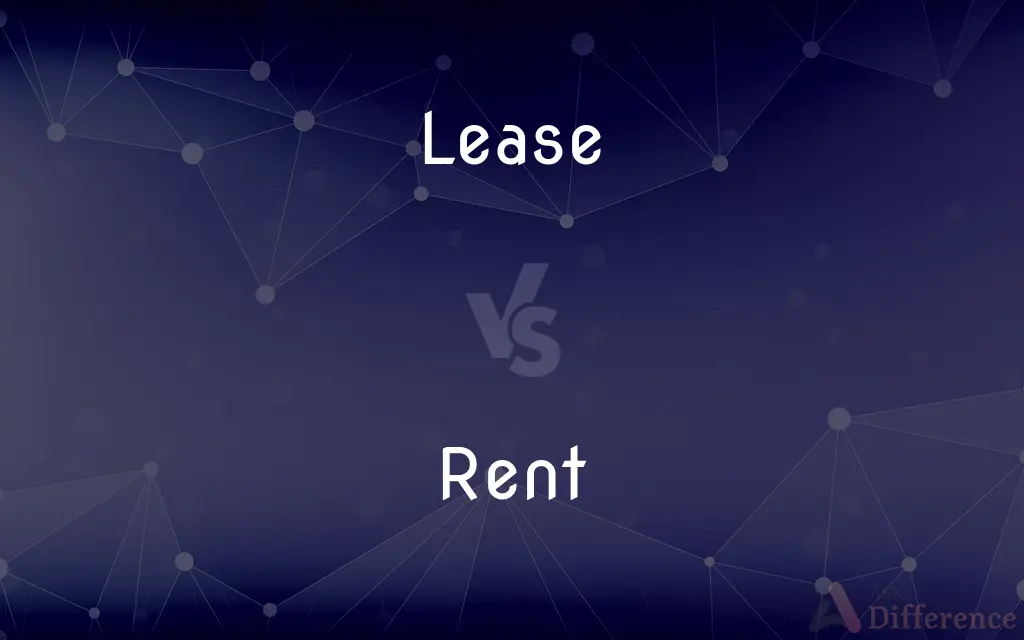Lease vs. Rent — What's the Difference?
By Tayyaba Rehman & Maham Liaqat — Updated on March 24, 2024
Lease typically refers to a longer-term agreement for using property or equipment, often with specific terms, while rent usually implies a shorter-term or month-to-month arrangement.

Difference Between Lease and Rent
Table of Contents
ADVERTISEMENT
Key Differences
Leasing involves a contractual agreement between two parties, the lessor and the lessee, for a fixed period, often including specific terms and conditions about the use of an asset (e.g., real estate, vehicles, equipment). Whereas, renting generally implies a more flexible agreement, often on a month-to-month basis, which can be altered or terminated with shorter notice.
While leases often last for several months or years and are bound by a fixed term during which the agreement cannot be easily changed without incurring penalties, renting arrangements offer greater flexibility, allowing either party to change the terms or terminate the agreement with much less notice, depending on the rental agreement.
In terms of payments, leasing agreements might include fixed payments for the entire lease term, and sometimes these payments might cover additional expenses like maintenance or taxes. On the other hand, rent payments are typically made monthly, and the cost can be adjusted at the end of each rental period or according to the terms of the rental agreement.
Leases are common in commercial and residential real estate, where long-term stability is important for both parties. Renting, while also used in real estate, is prevalent in situations requiring short-term accommodations, such as vacation rentals, or in cases where flexibility is a priority.
Despite their differences, both leasing and renting are governed by laws that protect the rights of both parties involved. These laws vary by location and are designed to ensure fairness and clarity in these agreements, addressing issues such as security deposits, eviction procedures, and maintenance responsibilities.
ADVERTISEMENT
Comparison Chart
Term
Fixed period, often long-term (e.g., one year or more).
Flexible, often short-term (e.g., month-to-month).
Flexibility
Less flexible, with terms set for the duration of the lease.
More flexible, with easier modification or termination of terms.
Payments
Payments may include additional expenses; fixed for the lease term.
Payments typically monthly, possibly adjustable at each period’s end.
Common Uses
Commercial and residential real estate, vehicles, equipment.
Residential real estate, vacation rentals, short-term use of goods.
Legal Protections
Governed by lease agreements outlining specific terms and conditions.
Governed by rental agreements, often with provisions for easier changes.
Compare with Definitions
Lease
Legally binding for set duration.
They're locked into a lease that doesn't expire until next year.
Rent
Typically implies shorter-term use.
They decided to rent a vacation home for the summer.
Lease
Fixed-term agreement.
The company entered a lease for office space for five years.
Rent
Can be adjusted or terminated with short notice.
The landlord raised the rent with a 30-day notice.
Lease
May have penalties for early termination.
Breaking the lease early resulted in a hefty fee.
Rent
Flexible agreement.
He rents his apartment with a month-to-month lease, giving him flexibility to move.
Lease
Includes specific terms.
Her car lease includes maintenance and roadside assistance.
Rent
Payments are usually monthly.
Her rent is due at the first of each month.
Lease
Often used for real estate and high-value items.
Leasing heavy machinery is common in the construction industry.
Rent
Widely used for various types of properties and goods.
Renting tools for a DIY project is an affordable option.
Lease
A lease is a contractual arrangement calling for the lessee (user) to pay the lessor (owner) for use of an asset. Property, buildings and vehicles are common assets that are leased.
Rent
Payment, usually of an amount fixed by contract, made by a tenant at specified intervals in return for the right to occupy or use the property of another.
Lease
A contract by which one party conveys land, property, services, etc. to another for a specified time, usually in return for a periodic payment
A six-month lease on a shop
Rent
A similar payment made for the use of a facility, equipment, or service provided by another.
Lease
Grant (property) on lease; let
She leased the site to a local company
Rent
The return derived from cultivated or improved land after deduction of all production costs.
Lease
A contract granting use or occupation of property during a specified period in exchange for a specified rent or other form of payment.
Rent
The difference between the price paid for use of a resource whose supply is inelastic and the minimum price at which that resource would still be provided. Also called economic rent.
Lease
The term or duration of such a contract.
Rent
An opening made by rending; a rip.
Lease
To grant use or occupation of under the terms of a contract.
Rent
A breach of relations between persons or groups; a rift.
Lease
To get or hold by such a contract.
Rent
To obtain occupancy or use of (another's property) in return for regular payments.
Lease
An interest in land granting exclusive use or occupation of real estate for a limited period; a leasehold.
Rent
To grant temporary occupancy or use of (one's own property or a service) in return for regular payments
Rents out TV sets.
Lease
An interest granting exclusive use of any thing, such as a car or boat.
Rent
To be for rent
The cottage rents for $1,200 a month.
Lease
The contract or deed under which such an interest is granted.
Rent
A past tense and a past participle of rend.
Lease
The document containing such a contract or deed.
Rent
A payment made by a tenant at intervals in order to occupy a property.
I am asking £100 a week rent.
Lease
The period of such an interest.
Rent
A similar payment for the use of a product, equipment or a service.
Lease
An open pasture or common.
Rent
(economics) A profit from possession of a valuable right, as a restricted license to engage in a trade or business.
A New York city taxicab license earns more than $10,000 a year in rent.
Lease
The place at which the warp-threads cross on a loom.
Rent
An object for which rent is charged or paid.
Lease
To grant a lease as a landlord; to let.
Rent
(obsolete) Income; revenue.
Lease
To hold a lease as a tenant.
I'm leasing a small apartment in Runcorn for a month while I'm there for work.
Rent
A tear or rip in some surface.
Lease
(transitive) To gather.
Rent
A division or schism.
Lease
(transitive) To pick, select, pick out; to pick up.
Rent
(transitive) To occupy premises in exchange for rent.
I rented a house from my friend's parents for a year.
Lease
(transitive) To glean.
Rent
(transitive) To grant occupation in return for rent.
We rented our house to our son's friend for a year.
Lease
(intransitive) To glean, gather up leavings.
Rent
(transitive) To obtain or have temporary possession of an object (e.g. a movie) in exchange for money.
Lease
To tell lies; tell lies about; slander; calumniate.
Rent
(intransitive) To be leased or let for rent.
The house rents for five hundred dollars a month.
Lease
To release; let go; unloose.
Rent
Simple past tense and past participle of rend
Lease
To gather what harvesters have left behind; to glean.
Rent
That has been torn or rent; ripped; torn.
Lease
To grant to another by lease the possession of, as of lands, tenements, and hereditaments; to let; to demise; as, a landowner leases a farm to a tenant; - sometimes with out.
There were some [houses] that were leased out for three lives.
Rent
To rant.
Lease
To hold under a lease; to take lease of; as, a tenant leases his land from the owner.
Rent
To tear. See Rend.
Lease
The temporary transfer of a possession to another person in return for a fee or other valuable consideration paid for the transfer;
Rent
To grant the possession and enjoyment of, for a rent; to lease; as, the owwner of an estate or house rents it.
Lease
The contract for such letting.
Rent
To take and hold under an agreement to pay rent; as, the tennant rents an estate of the owner.
Lease
Any tenure by grant or permission; the time for which such a tenure holds good; allotted time.
Our high-placed MacbethShall live the lease of nature.
Rent
To be leased, or let for rent; as, an estate rents for five hundred dollars a year.
Lease
Property that is leased or rented out or let
Rent
An opening made by rending; a break or breach made by force; a tear.
See what a rent the envious Casca made.
Lease
A contract granting use or occupation of property during a specified time for a specified payment
Rent
Figuratively, a schism; a rupture of harmony; a separation; as, a rent in the church.
Lease
The period of time during which a contract conveying property to a person is in effect
Rent
Income; revenue. See Catel.
[Bacchus] a waster was and all his rentIn wine and bordel he dispent.
So bought an annual rent or two,And liv'd, just as you see I do.
Lease
Let for money;
We rented our apartment to friends while we were abroad
Rent
A certain periodical profit, whether in money, provisions, chattels, or labor, issuing out of lands and tenements in payment for the use; commonly, a certain pecuniary sum agreed upon between a tenant and his landlord, paid at fixed intervals by the lessee to the lessor, for the use of land or its appendages; as, rent for a farm, a house, a park, etc.
Lease
Hold under a lease or rental agreement; of goods and services
Rent
That portion of the produce of the earth paid to the landlord for the use of the "original and indestructible powers of the soil;" the excess of the return from a given piece of cultivated land over that from land of equal area at the "margin of cultivation." Called also economic rent, or Ricardian rent. Economic rent is due partly to differences of productivity, but chiefly to advantages of location; it is equivalent to ordinary or commercial rent less interest on improvements, and nearly equivalent to ground rent.
Lease
Grant use or occupation of under a term of contract;
I am leasing my country estate to some foreigners
Rent
A regular payment by a tenant to a landlord for use of some property
Lease
Engage for service under a term of contract;
We took an apartment on a quiet street
Let's rent a car
Shall we take a guide in Rome?
Rent
An opening made forcibly as by pulling apart;
There was a rip in his pants
She had snags in her stockings
Rent
The return derived from cultivated land in excess of that derived from the poorest land cultivated under similar conditions
Rent
The act of rending or ripping or splitting something;
He gave the envelope a vigorous rip
Rent
Let for money;
We rented our apartment to friends while we were abroad
Rent
Grant use or occupation of under a term of contract;
I am leasing my country estate to some foreigners
Rent
Engage for service under a term of contract;
We took an apartment on a quiet street
Let's rent a car
Shall we take a guide in Rome?
Rent
Hold under a lease or rental agreement; of goods and services
Common Curiosities
Can you negotiate the terms of a lease or rental agreement?
Yes, terms can often be negotiated before signing, though leasing agreements may offer less flexibility once in effect.
Are there legal protections for both lessees and renters?
Yes, both are protected under laws that vary by jurisdiction, addressing issues like security deposits, maintenance, and eviction.
Is it cheaper to lease or rent?
It depends on the terms and the type of property or item. Short-term needs might be cheaper to rent, while leasing can offer better value for long-term use.
What is the key difference between leasing and renting?
The key difference is the duration and flexibility; leasing is typically for a longer fixed term with specific conditions, while renting is more flexible and often short-term.
Can lease agreements be broken?
Yes, but breaking a lease can incur penalties as outlined in the lease agreement.
How does a lease affect your credit score?
Consistently paying a lease on time can positively affect your credit score, similar to other forms of credit.
Do leases and rents apply to both residential and commercial properties?
Yes, both terms can apply to residential and commercial properties, though leases are more common for commercial use due to the longer-term stability they offer.
What happens at the end of a lease term?
At the end of a lease term, the lessee may have the option to renew the lease, move out, or possibly purchase the leased property, depending on the terms.
Can you sublet a leased or rented property?
Subletting depends on the terms of the lease or rental agreement; some allow it, while others prohibit or restrict subletting.
What are common penalties for breaking a lease?
Penalties can include forfeiting security deposits, paying the remainder of the lease, or other fees specified in the agreement.
Is maintenance included in leases and rents?
Maintenance responsibilities vary; they can be included in leases, especially for commercial properties, while residential rentals might place more responsibility on the landlord.
Why choose to rent instead of lease?
Renting offers more flexibility, making it ideal for short-term needs or when future plans are uncertain.
What rights do tenants have under a lease or rental agreement?
Tenants have rights to a safe and habitable environment, privacy, and to not be unfairly evicted, among others, as defined by local laws.
How are disputes between landlords and tenants resolved?
Disputes can often be resolved through mediation, arbitration, or court proceedings, depending on the severity and jurisdiction.
How do you terminate a rental agreement?
Termination typically requires notice as specified in the agreement, often 30 days for month-to-month rentals.
Share Your Discovery

Previous Comparison
Clairvoyant vs. Prescient
Next Comparison
Feel vs. TouchAuthor Spotlight
Written by
Tayyaba RehmanTayyaba Rehman is a distinguished writer, currently serving as a primary contributor to askdifference.com. As a researcher in semantics and etymology, Tayyaba's passion for the complexity of languages and their distinctions has found a perfect home on the platform. Tayyaba delves into the intricacies of language, distinguishing between commonly confused words and phrases, thereby providing clarity for readers worldwide.
Co-written by
Maham Liaqat















































